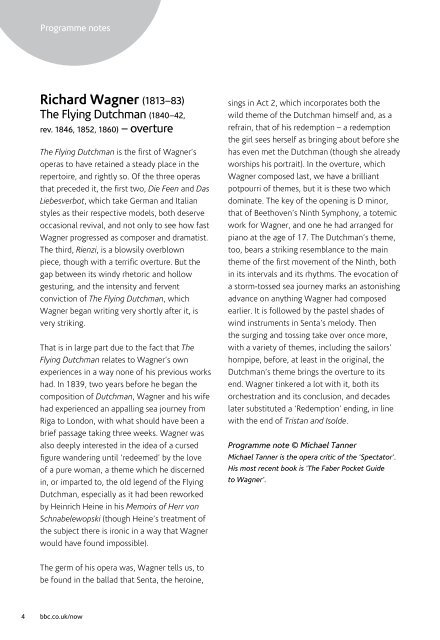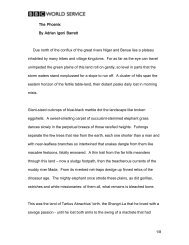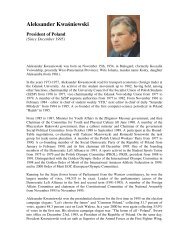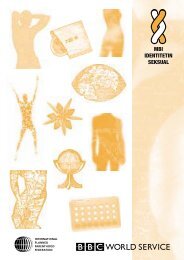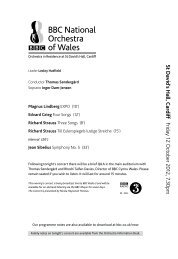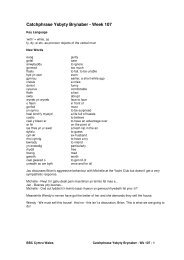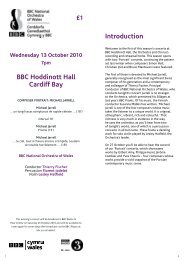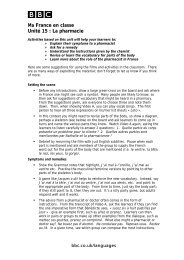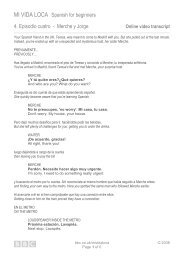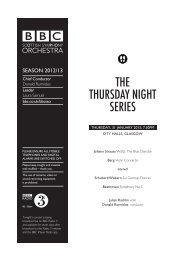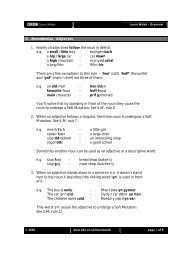Find out more by downloading our programme notes - BBC
Find out more by downloading our programme notes - BBC
Find out more by downloading our programme notes - BBC
Create successful ePaper yourself
Turn your PDF publications into a flip-book with our unique Google optimized e-Paper software.
Programme <strong>notes</strong><br />
Richard Wagner (1813–83)<br />
The Flying Dutchman (1840–42,<br />
rev. 1846, 1852, 1860) – overture<br />
The Flying Dutchman is the first of Wagner’s<br />
operas to have retained a steady place in the<br />
repertoire, and rightly so. Of the three operas<br />
that preceded it, the first two, Die Feen and Das<br />
Liebesverbot, which take German and Italian<br />
styles as their respective models, both deserve<br />
occasional revival, and not only to see how fast<br />
Wagner progressed as composer and dramatist.<br />
The third, Rienzi, is a blowsily overblown<br />
piece, though with a terrific overture. But the<br />
gap between its windy rhetoric and hollow<br />
gesturing, and the intensity and fervent<br />
conviction of The Flying Dutchman, which<br />
Wagner began writing very shortly after it, is<br />
very striking.<br />
That is in large part due to the fact that The<br />
Flying Dutchman relates to Wagner’s own<br />
experiences in a way none of his previous works<br />
had. In 1839, two years before he began the<br />
composition of Dutchman, Wagner and his wife<br />
had experienced an appalling sea j<strong>our</strong>ney from<br />
Riga to London, with what should have been a<br />
brief passage taking three weeks. Wagner was<br />
also deeply interested in the idea of a cursed<br />
figure wandering until ‘redeemed’ <strong>by</strong> the love<br />
of a pure woman, a theme which he discerned<br />
in, or imparted to, the old legend of the Flying<br />
Dutchman, especially as it had been reworked<br />
<strong>by</strong> Heinrich Heine in his Memoirs of Herr von<br />
Schnabelewopski (though Heine’s treatment of<br />
the subject there is ironic in a way that Wagner<br />
would have found impossible).<br />
sings in Act 2, which incorporates both the<br />
wild theme of the Dutchman himself and, as a<br />
refrain, that of his redemption – a redemption<br />
the girl sees herself as bringing ab<strong>out</strong> before she<br />
has even met the Dutchman (though she already<br />
worships his portrait). In the overture, which<br />
Wagner composed last, we have a brilliant<br />
potp<strong>our</strong>ri of themes, but it is these two which<br />
dominate. The key of the opening is D minor,<br />
that of Beethoven’s Ninth Symphony, a totemic<br />
work for Wagner, and one he had arranged for<br />
piano at the age of 17. The Dutchman’s theme,<br />
too, bears a striking resemblance to the main<br />
theme of the first movement of the Ninth, both<br />
in its intervals and its rhythms. The evocation of<br />
a storm-tossed sea j<strong>our</strong>ney marks an astonishing<br />
advance on anything Wagner had composed<br />
earlier. It is followed <strong>by</strong> the pastel shades of<br />
wind instruments in Senta’s melody. Then<br />
the surging and tossing take over once <strong>more</strong>,<br />
with a variety of themes, including the sailors’<br />
hornpipe, before, at least in the original, the<br />
Dutchman’s theme brings the overture to its<br />
end. Wagner tinkered a lot with it, both its<br />
orchestration and its conclusion, and decades<br />
later substituted a ‘Redemption’ ending, in line<br />
with the end of Tristan and Isolde.<br />
Programme note © Michael Tanner<br />
Michael Tanner is the opera critic of the ‘Spectator’.<br />
His most recent book is ‘The Faber Pocket Guide<br />
to Wagner’.<br />
The germ of his opera was, Wagner tells us, to<br />
be found in the ballad that Senta, the heroine,<br />
4<br />
bbc.co.uk/now


